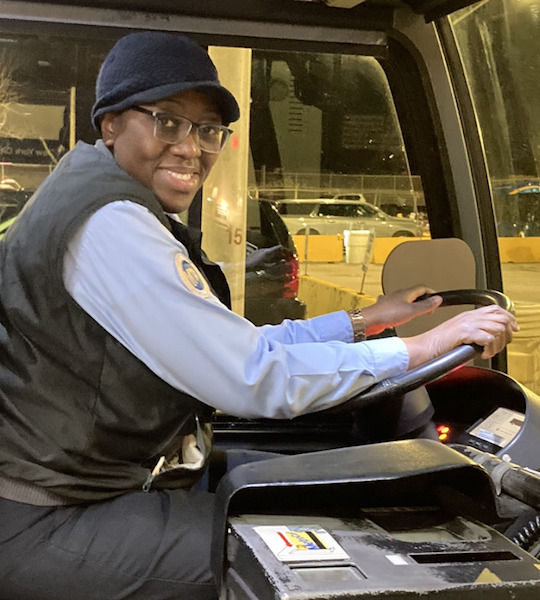New York, NY – Local 1056 Bus Operator Bernadine Kamwanya has been on the job for almost fifteen years. She drives the Q43 in Queens. Before that it was the the Q27 and the Q88. When the pandemic hit, Kamwanya was amongst an elite group of working class heroes who risked all to help keep New York City moving. Along the way, she’s witnessed some of Covid’s tragic affects first-hand and suffered direct threats to her personal safety.
LaborPress recently caught up to Kamwanya to talk about being behind the wheel throughout it all.

LP: You’ve worked since the pandemic started. What was that like for you?
BK: It was really scary because I was not informed about the severity of the virus. It was really scary to be around. It was scary coming to work because we did not have enough information. I was trying to listen to the news or watch CNN — that’s where I was getting most of [my] information.
LP: So, you basically had to self-educate?
BK: Yeah.
LP: And whose responsibility would it have been to inform you?
BK: MTA was responsible to give us PPE [Personal Protection Equipment] from the beginning; to prepare [us] in order to deal with our customers.
LP: How long did it take for the MTA to provide you with PPE?
BK: It was really late — after we lost a lot of people. The problem was the customers. Customers were complaining. Like I was saying before at the beginning, I had to go home and do my own research and try to protect myself. But when we used to come to work and wear masks, customers used to complain about it.
LP: Why did customers complain about you wearing masks?
BK: Because they did not have enough information either. So, by us wearing the masks, that means the virus was dangerous. So they’re like, ‘Why do we have to wear it when [we] are not being told [about Covid’s dangers]’?
LP: So, customers were not wearing them?
BK: No. There was a conflict between the customers and the drivers.
LP: You said you were worried. Did you or other workers that you know get sick?
BK: Yes. Some people I knew got sick and some people even died. A lot of them that I knew — the next minute they’re in the hospital or in a coma. Then, two or three days later, they’re like, ‘Oh, he passed away.’ It was very bad.
LP: What about other kinds of safety issues? Have you, as a transit worker, experienced violence or intimidation on the job?
BK: It’s funny, I just had an incident and the subject was still on Covid because people are not wearing their masks on the bus. So, what we’re asked to do, is to open the windows. Open the windows in the wintertime, the summertime — have the windows open, so it will be safe for [bus operators] and our customers. I had one customer, one female customer in particular, who came and made a big deal about it for two days. I had to call the police and file a report against this customer. That’s because I opened the windows — and she was a nurse! She wanted me to close the windows because it was cold.
LP: What do you think can be done to increase safety for drivers? Is there anything you would like to see?
BK: It would be nice if just every once in a while the police could come, especially when we make a complaint or we have an assault or threat. But having police officers on every bus – that’s impossible.






